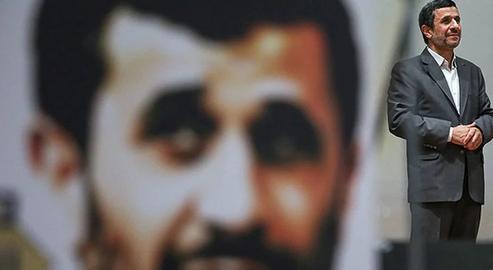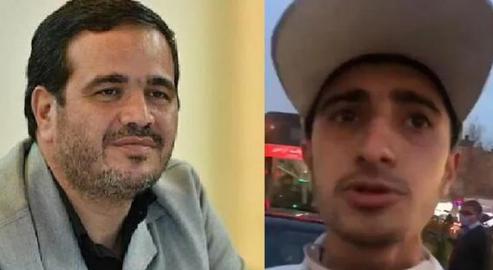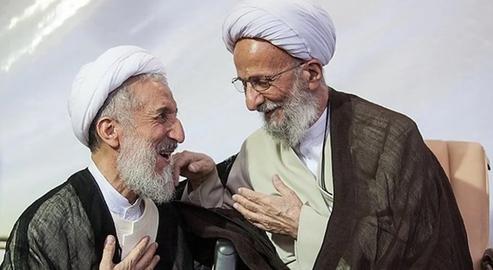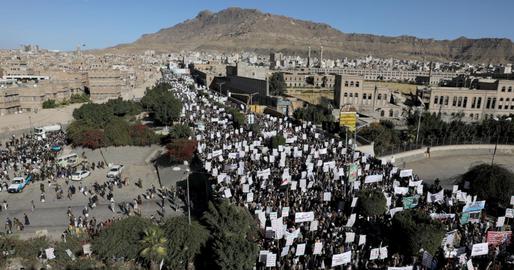Four days ago, an incendiary video was released in which a traffic warden claimed to have been slapped by sitting member of the Iranian parliament. Since then the latter has addressed the matter several times, but repeatedly contradicted himself, meaning at least some of what he told the public had to have been a lie.
The fact that this caused so little consternation inside Iran is itself telling. In the political sphere of the Islamic Republic, lying has become such a commonplace occurrence that it barely raises a comment. But why, and to what purpose?
***
"Ahmadinejad was a liar," Parviz Kazemi, the welfare minister in ex-president Mahmoud Ahmadinejad's first cabinet, would retrospectively declare in an interview in 2014. “For example. He’d have a meeting with me at noon. We’d talk, and then that night he’d say somewhere else that he had been in Isfahan since the morning. He’d go on to talk and explain it in such a way that even I would be convinced. I’d say to myself, ‘Maybe it was yesterday that I saw him."
Was Ahmadinejad an exception, or simply the first among equals when it came to compulsive mendacity? In the last month two major news stories in Iran have again brought this question to the fore.
On Saturday, a video was posted online in which a young traffic warden claimed that Ali Asghar Anabestani, the MP for Sabzevar in Razavi Khorasan province, had slapped him on the Tehran highway after his car was pulled over for driving in the wrong lane. In public statements and appearances over the days that followed, Anabestani changed his story several times; first he claimed to have not got out of the car at all, then admitted that he had “pushed” the officer. His description of the words exchanged during the altercation changed repeatedly too, from his first discussion with the IRIB to the story he published on his own website.
Meanwhile, in the aftermath of the death of Ayatollah Mohammad Taghi Mesbah Yazdi in December, Tehran’s temporary Friday Imam Kazem Seddiqui raised eyebrows with his bizarre remarks in a broadcast on the IRIB about “the corpse of Mohammad Taghi Mesbah Yazdi opening his eyes and smiling after death".
The claim caused a sensation, and Seddiqui was forced to backtrack, saying it was actually the person who washed the body that had said this. Then, however, the outspoken lawmaker Ahmad Tavakoli revealed that the person who carried out the bathing was none other than pasta magnate and super-creditor Reza Motalebi Kashani, one of the richest people in Iran. This in turn led to a flurry of stories about the well-connected capitalist "washing the bodies of the ulema in his 5,000-square-meter garden". Whatever the truth of the Ayatollah Mesbah Yazdi affair – or whether or not the corpse of fellow high-ranking scholar Ayatollah Azizolah Khoshoghat was also bathed in the same garden – it prompted a garbled mixture of official confirmations and denials and the matter, unlike the clerics, has yet to be put to rest.
As a side note, one of Reza Motalebi Kashani’s relatives is Alireza Panahian: a cleric close to the security services who speaks at length on justice and the fight against corruption. In a speech Panahian once said that if people knew the reality of his living conditions, they would “collect donations” on his behalf. It later turned out that Panahian owns a luxurious billion-dollar house in Saadatabad neighborhood of Tehran. When he tried to deny this, it transpired that he had seized this very expensive piece of land from an Iranian citizen living abroad – and that he too was a partner in Kashani’s massive Tak Macaron pasta export company.
Forty Years of Falsehoods
Most of the information above surfaced in the last few months alone. But in the upper eschelons of the Islamic Republic’s system of governance, lying has been endemic for decades now – going all the way back to 1978, when believers were told that if they looked closely, they’d be able to make out Ayatollah Ruhollah Khomeini’s face on the moon.
Building a platform of legitimacy on lies is not unique to one particular political faction, institution or specific individual in Iran. It occurs across the board. During the Iran-Iraq war Iranians were told they would see “the image of the Lord of the Age [Imam Zaman] on the battlefront”. The smearing of Akbar Hashemi Rafsanjani paved the way to the premiership of Ali Khamenei. Then brazen nonsense reached new heights under the Ahmadinejad administration, when the president claimed a “halo of light” had encircled his head during a speech to the UN. In the past 18 months officials of all stripes have been observed to outright lie, distort the facts and contradict themselves in public statements on such major incidents as the November 2019 massacre of demonstrators, the downing of Ukrainian Airlines Flight 752 by the Revolutionary Guards, and perhaps most of all, the coronavirus pandemic in Iran.
Wherever You Go, is the Sky the Same Color?
It would be easy to give Iranian politicians a free pass with any one of a number of flippant comments: “people lie", "politicians all over the world lie". But this is to miss the point.
The lies mentioned in above examples are distinct from the kind of truth-distortion that regularly occurs in the political arenas of different countries all over the world. A government may claim that it sometimes has to hide the truth in order to protect military and security secrets, for instance. But in Iran, no such justification is made. These lies occur in a vacuum – as false additions, not tactical omissions.
The way that Iranian society looks at these lies, and how common or untrue lies have become, is similarly not the point. The people of a country, whether they are more inclined to lie or to be truthful, measure their relationship to the truth fundamentally differently to those of government officials.
So What is it For?
Mohammad Beheshti, the former head of the Iranian judiciary who was assassinated in the early years after the Islamic Revolution, used to say: "Is it not possible to build a society based on lies to the end; it is not possible." But the 41-year history of the Islamic Republic shows the naivety of such a standpoint, and as Ahmad Tavakoli, a member of the Expediency Council, has since said: "We lied to the people. Now we are called liars."
A false translation of the words of former Egyptian President Mohamed Morsi aired during the Non-Aligned Movement summit in Tehran showed that sometimes there is no pragmatic reason to lie. As Hasan Rahimpour Azghandi, member of the Supreme Cultural Revolution Council said, even Hasan Rouhani has admitted that his words in public and in private are contradictory.
Of course, in most cases, it is possible to identify some justification or half-justification for the lies told by those in power in the Islamic Republic. First and foremost, it should be noted that there are no criminal ramifications for lying in the Iranian political sphere: ultimately it is considered a moral vice that may be exploited, but not an offence or dereliction of duty. For this reason, where revealing the lies of an official in another country in the world can have serious consequences and even leads to the collapse of a government, in Iran it has no practical effect.
One of the core impetuses for political lying in Iran is to present a false image of the country to outsiders. From painting civil society as the "City of the Prophet" to the mendacities that the Foreign Minister of the Islamic Republic repeats in his interviews in English, a picture of an alternate Iran Is being painted. In exceptional cases, some officials of the Islamic Republic have openly admitted to having lied to the world.
Internally, politicians often lie in order to try to gain legitimacy or in the service of ideology, as in the examples mentioned above. But in addition, huge swathes of the innumerate lies told by officials of the Islamic Republic pertain to themselves, their personal lives and economic concerns. Almost all of them have daubed-on ascetic faces, but don’t hesitate to acquire cash, influence and tangible assets at the first opportunity. There was no doubt that the list of personal properties recently published by Mohammad Baqher Ghalibaf, the Speaker of the Iranian Parliament, was false, for example. But on the one hand it was not considered a crime to falsify this – indeed, it was in line with the need to present the Islamic Republic as expedient.
When an official does – either knowingly or inadvertently – reveal a part of the hidden internal life of the Islamic Republic, he or she is generally forced to repent and retract it. Recently, for example, Parviz Fattah, head of the immensely powerful extra=governmental Foundation for the Oppressed, was made to publicly apologize after exposing the Foundation’s illegally-held assets, seizure of confiscated property, and ownership of luxury homes.
As long as lies and lying are only subject to moral condemnation and not treated as a crime or dereliction, they will continue to be commonplace. The Supreme Leader of the Islamic Republic, Ali Khamenei, has said: "Anyone who claims to be under pressure for criticizing the government is lying." One might start by calling out this very lie.
visit the accountability section
In this section of Iran Wire, you can contact the officials and launch your campaign for various problems



























comments